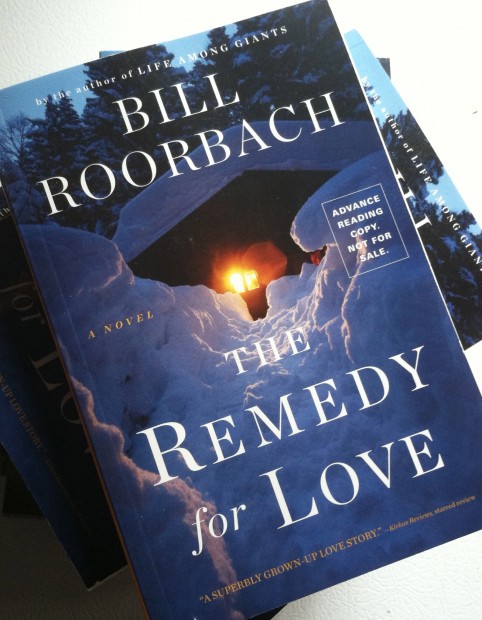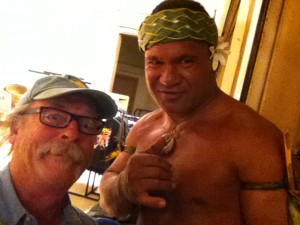The Remedy for Love Pretend Dinner Party and Group Interview
categories: Cocktail Hour / Reading Under the Influence / Table For Two: Interviews
Comments Off on The Remedy for Love Pretend Dinner Party and Group Interview
It’s such a pleasure to talk about a new book with friends and acquaintances that I thought I’d host a dinner party to do just that, invite a bunch of writers, readers, booksellers, radio hosts, filmmakers, and musicians, among others, to a bash in celebration of The Remedy For Love. We’ll meet somewhere nice, since it’s all going to be pretend anyway. I’m thinking Kauai, the garden isle of Hawaii, and will foot the pretend bill for all that pretend travel to a pretend luau, complete with fire dancing and hula lessons, all under a flapping tent, ocean breezes, tropical warmth, a fine contrast to the weather in the new novel, which is cold, cold, cold, a blizzard of epic proportions. I’ve given my guests just a little to go on—a quick description of the novel (a small town lawyer tries to help a homeless woman and ends up stuck in a cabin with her during the storm of the century…) , and the quotes above from Peter Heller and David Abrams (two terrific novelists I had the good fortune to meet on the Life Among Giants tour). Because, I don’t want to give away too much! And now, everyone’s assembled, huge round table, cheerful (and well-tipped) servers dropping fabulous food, bowls of rum punch, bottles of wine. Everyone has a gift copy of The Remedy for Love, still gaily wrapped (do not open until October 14, 2014, which is publication day!). The dancing has yet to begin. Amid the laughter, someone speaks up, gets us started.
Melissa Falcon, novelist: Thanks for the month in Hawaii, Bill. That’s one way to get to be the center of attention, you big showoff.
Ellen Cooney, novelist: I’ve got a question for you: How did the title happen? At the start or later? I’m feeling the coolness of the “For” where one would expect an “Of.” Somehow it puts out a sense of something startling and totally genuine.
 Bill (looking out over the surf to the horizon): Wow, thanks, I agree. The working title was Storm of the Century. Which isn’t bad, except that it was a Stephen King book some years back. And sounded a little too much like nonfiction, especially since the weather is just part of the story. My editor, Kathy Pories, and I batted around all kinds of ideas, a lot of laughs (Two People Stuck in a Storm, They Met in a Grocery Store, The Shining), but nothing great was emerging. Then I remembered my friend Liesel Litzenburger, who is a novelist herself, and a kind of title savant. I sent her a very brief description of the book via email, and not four minutes later she shot back a thorough reply (including citations), the story of Henry David Thoreau and his only love. Suffice it to say, the object of Henry’s affection shot him down. And he went home and wrote in his Journals, “The only remedy for love is to love more.” Liesel said, “So there’s your title, The Remedy for Love, but I don’t know if you’re woman enough to pull it off.”
Bill (looking out over the surf to the horizon): Wow, thanks, I agree. The working title was Storm of the Century. Which isn’t bad, except that it was a Stephen King book some years back. And sounded a little too much like nonfiction, especially since the weather is just part of the story. My editor, Kathy Pories, and I batted around all kinds of ideas, a lot of laughs (Two People Stuck in a Storm, They Met in a Grocery Store, The Shining), but nothing great was emerging. Then I remembered my friend Liesel Litzenburger, who is a novelist herself, and a kind of title savant. I sent her a very brief description of the book via email, and not four minutes later she shot back a thorough reply (including citations), the story of Henry David Thoreau and his only love. Suffice it to say, the object of Henry’s affection shot him down. And he went home and wrote in his Journals, “The only remedy for love is to love more.” Liesel said, “So there’s your title, The Remedy for Love, but I don’t know if you’re woman enough to pull it off.”
Bill Lundgren, Bookseller at Longfellow Books, Portland, Maine: How much of this new novel has been influenced by the syndrome that John Gorka characterized in song as “The one who got away,” the lost love or fleeting love or missed connection that haunts ever after?
Bill: Maybe in this case more like “The one who couldn’t get away.”
Sarah Bagsby, Watermark Books and Café, Wichita, Kansas: Will there by any children?
Bill: I think we might be getting ahead of ourselves a little here. We don’t even know what’s going to happen when these two meet!
Jamie Ford, novelist: When was the last time that someone broke your heart? Who was it? And are you over it?
Bill: Oh, a while back. I’ve been with Juliet for thirty-something years. But my heart is broken reading all the time, and watching movies, even listening to music, or hearing the news on the radio. I cried when Phillip Seymour Hoffman died. But I guess that’s not quite what you mean.
Desi Van Til, screenwriter, producer (brandishing a leg of suckling pig): The setup for this book sounds like it could be seamlessly translated into a stage play or musical. Has it ever occurred to you to adapt this novel into another medium?
Bill: Of course, I always think about that, at least once the book is done. I’d love an opera of The Remedy For Love. You could have these, like, ghostly figures lit behind scrims the whole time singing all the backstory, while the main characters roamed the stage. The fake snow alone would cost a billion dollars, and the cleaning staff would be grumpy. But what a show! And, seriously, I think it’s going to make a great movie. In a way, it’s already halfway to being a stage play—I use a lot of dialogue in the telling of this one. And I would dearly love to have even the slightest thing to do with live theater. Thanks for the chance to fantasize.
Jeff Young, keyboardist and singer with Jackson Browne, Sting, Steely Dan:
Bill, I’ve come up with a term for a certain type of creative musician. I call it SIME:
Self Indulgence at My Expense. Could be a solo played too long by a jazz musician,
A singer who chooses gospel embellishment over the melody, or someone who expects me to spend more time to perform their music than they are paying me for! My question is, can a work of fiction be longer than is necessary, and who would the author
trust to tell him or her that it might be? Would it have to be another author, or could it be
an observant friend?
Bill: I love these hypothetical questions! Life Among Giants was on the long side, especially in draft, and the one to tell me was my editor, among others. But I know you’re not talking about that! This book? The Remedy for Love? This one I started out with the idea that it would be short and sweet. And it is. Two characters, one setting (more or less), backstory under control, all to be read in a frenzy. I want to keep people up all night, get them fired from their jobs for sleepwalking.
Cheryl McKeon, Manager, Book Passage Ferry Building, San Francisco: You have such an appreciation for nature. Is it tempting to use fiction to write a fable incorporating global warming or other threats to the earth?
Bill: Yes, and along with Eric and Danielle, nature is a main character here. A terrible storm could come in any era, but these super storms are coming much more frequently, and all around the world. It wasn’t hard to imagine my way into a spectacular and historic blizzard here in Maine. And we’ve just come through a really fantastic snow winter, along with much of the rest of the northern hemisphere.
Kent Wascom, novelist: As a Gulf Coaster who harbors an irrational yet no less acute fear of cold and snow, the thought of the drifts piling higher and higher outside that cabin gives me the horrors. What’s the worst snow-tastrophe you’ve experienced?
Bill: I really feel like I’ve experienced this one, the one in the book. I was working on revisions last summer and it was like eighty degrees, but I’d shiver and work and be surprised when I looked up to find it was still summer. And just this last February it took me two extra days to get to BooksAlive, a book festival in Panama City, Florida. Because of snow in Panama City! Like an inch, but that was a catastrophe in those parts. I spent one night at an airport hotel in Boston, the next at a similar one in Baltimore. Great chowder the first night, great crabcakes the second. 27 degrees when I got to Florida, and here I’d pictured myself lying on the beach in my bikini!
Tony Simmons, novelist and journalist, Panama City, FL: Bill, based on the title, (and sorry about the weather) I would wonder if you (or rather, your characters) view love as a disease, passed through an unknown vector (possibly via eye contact?) — a condition to be avoided or perhaps inoculated against, a weakness of heart and mind that can only be remedied … how? Does the vaccine include a sample of dead love germs to initiate a specific immunity?
Bill: My two main characters, Eric and Danielle, have had a rough go with love and a lot else, and might very well find the whole romance business pathological. And they definitely want to avoid contagion. But, remember what Thoreau confided to his journal: Love more!
Ilie Ruby, novelist, Boston, MA (sloshing her Mai Tai): If you had to create a tincture to “cure” love, what ingredients would you use for the formula?
 Bill: Ilie, we are going to make some money on this one. I think it would contain essence of love, for one thing, which can take years to distill a single drop. The rest of the ingredients are proprietary, though I wouldn’t be surprised to find alcohol involved.
Bill: Ilie, we are going to make some money on this one. I think it would contain essence of love, for one thing, which can take years to distill a single drop. The rest of the ingredients are proprietary, though I wouldn’t be surprised to find alcohol involved.
Abigail Thomas, memoirist, New York City: Would The Remedy For Love have worked in a heat wave with lots of flies? Is bad weather one of your favorite characters? Is it still snowing up there?
Bill: That’s the nice thing about winter—no flies. And, come to think of it, there is an outhouse in the story, though it doesn’t fare well. Bad weather is a great character. I’m so happy to be in Hawaii. You mean snowing up here at the head of the table, yes? Yes. Yes it is. It seems to snow wherever I go.
Christine Byl, memoirist, Healy, Alaska: I’m a sucker for epic winter snowstorms. Which came first, the storm or the story?
Bill: The storm came third, after Eric, and then Danielle. I needed a mechanism to bring them together, then keep them together, since they’d never have done it on their own! And the storm just kept getting worse.
Janet Mills, Attorney General of Maine: What prompted you to use a lawyer as one of your main characters in this romantic-sounding novel? What is it about the character’s profession as a small town lawyer that contributes most to the plot and character development in this story?
Bill: You’re right. For a proper romance, I should have made him a lumberjack. But his profession in a small town means he’s seen the seamy underside of things. And he knows everyone, one way or another. His view of the town gives the reader a sense of setting, of the interrelatedness of people and professions. He’s seen a lot of people in trouble, and really, what he’s seen makes him disinclined to help in this case. But then, of course, he does. And soon it’s a question of who’s rescuing whom.
Cheryl McKeon: Does The Remedy for Love have a mystery inherent in the plot, or is it more of a romance?
Bill: The mysteries here are in who these people really are, as the disaster forces them to confront their own myths. If it’s a romance, it’s a prickly one, and enacted in an emergency.
Melissa Falcon (appearing suddenly in a hula skirt and leaping to the table—one lesson and she’s a pro! More than that, she’s discovered the great spirituality of hula, an impressive performance, all while talking seriously): Bill, Eric discovers that Danielle is married to a guy named Jimmy, that there’s profound history between the two of them, Yet the information Eric gets is fragmented, disordered, bits of backstory, scandal, intense sexuality, love and heartbreak, terrible trouble.
Bill: Where did you get an advanced reading copy?
Susan Gregg Gilmore, novelist: You get into a woman’s head and heart like no other male writer I know. How come you’re so damn good at that—were you raised by older sisters?
Bill: I’m sure that’s the nicest compliment I’ve gotten in my career. I have younger sisters, two of them, who will probably laugh at this question. But I always paid a lot of attention to them, and to all the women in my life, and learned what I could, which is that we all have a little of the other in us, some of us a lot. Another great source of intelligence was twenty-five years of teaching college and graduate creative-writing classes (though I now write full-time): I got to glimpse the hearts and souls of a lot of very different young women (men too) who were talking about, recreating, and even living through every imaginable disaster and joy. People are people, and much of the rest when it comes to gender is just a social veneer. Then again, vive la difference.
Cheryl McKeon: Was it difficult to create a protagonist as likable and intriguing as Lizard?
Bill: The challenge, really, is not to write the same character over and over. Eric is more guarded and yet more porous than Lizard, but way more practical, too. He’s got a smug corner that will make it harder to like him at first, but I hope in the end he can win us all over.
Alise Wascom, novelist and bookseller emeritus: How do you plan to celebrate on the publication day of The Remedy for Love?
Bill: I hope I’ll be doing a reading at some great independent bookstore somewhere! And drinks after, showers of confetti!
Erika Shepard Robuck, novelist: Bill, I really, really want to know why you write. Is your reader in your mind when you work, or are you satisfying a private impulse? Would you write if you couldn’t get published? Does writing help you figure out the answers to the questions you ask?
Bill (with a reflective gulp of spiked coconut milk): I have often wondered this over a long career of ups and downs. I certainly kept writing when I wasn’t getting published. A capacity for suffering is a trait most writers need to cultivate. An ideal reader floats in and out of mind as I work, at least when it’s going well, someone who gets what I’m doing and appreciates what it costs, who laughs at what’s funny and cries at what’s sad. On bad days, the opposite, a kind of Wicked Witch of the West who keeps asking who the hell I think I am. Really, though, lately, all these years of battling away, I’ve gotten to where most of the pleasure is in the making. And maybe at long last I’m not so desperate to be loved. I type and I type, and with luck, someone reads. That’s enough love for me. Like these stray letters—someone’s found a book of mine in their local library and just wanted to let me know they enjoyed it. That’s worth a lot.
Sarah Bagby, Watermark Books and Café, Wichita, Kansas: Do you write standing up?
Bill: Sometimes. Helps my aching back and neck. I also write in my head pretty much whenever I’m walking, which is a lot. I still haven’t figured out how to write lying down.
Sarah Bagby: How did you do your research?
Bill: So much comes from experience, of jobs, relationships, people, events. The rest comes from the library, and increasingly, the Internet. And I talk to people, and email them, ask about their jobs, or their neighborhoods, or their experience of plowing the roads in huge snowstorms, for one example relevant to The Remedy For Love. For another example from this book, I needed help understanding the physics of heating water, and reading and web surfing didn’t help. So I wrote to a physicist friend here at the university, and he laid out the problem for me in simplest terms, then added a layer of complication, including some vocabulary I was able to make use of.
Kent Wascom: Is there a certain work in the literature of maroonment that was particularly influential or inspirational?
Bill: Oh, I hadn’t thought of it that way. Maroonment! Wow. Pass the taro rolls? But of course, that’s exactly right. I loved The Swiss Family Robinson when I was a kid, and Robinson Crusoe. I just re-read the Mutiny on the Bounty trilogy, and it’s fantastic, and based on a true story, killer: so taut, so compelling. Writers that inspired me toward The Remedy For Love are more contemporary, though, like Jim Crace, and Ian McEwan. And oh, there’s a great book that’s essentially about a young couple marooned in their own love story: Endless Love, by Scott Spencer, a great favorite, even if the movie was so-so. And I love those big Bronte novels, either sister, and most anything by George Eliot, those great heroines marooned in their times!
Ellen Cooney: It’s so brave and daring to make a novel with such an elemental plot–and it’s a love story! I’m wondering what the writing experience was like in terms of getting to a point (early, middle, late?) where you felt, oh my God, what am I doing here? Like you were maybe as snowed in as your characters? Like you were maybe scared or a little bit worried?
Bill: Definitely scared, both as a writer and for these people. I once confided the writer part of the fear to Lee K. Abbott, my colleague back in the day at Ohio State. He said, “Of course we’re scared. We’re always trying to do the thing we can’t do.”
Melissa Falcon: What was the thing you couldn’t do here?
Bill: Pull off such a tense story in such a tight space within an emergency and somehow keep it tender.
Christine Byl: What is love the remedy for?
Bill: I think, to be serious, that love fixes everything, big love, I mean, the kind that rhymes with compassion: aloha.
Susan Gregg Gilmore: You’re pretty funny on your feet, Bill, and you weave just the right dose of comic relief into some of the tensest moments of your writing. Now I’m already picturing some nail-biting scenes for Danielle and Eric, hunkered down in an isolated cabin, buried in snowdrifts, in the middle of Maine. Please tell me I’m going to laugh just when I need it most! Please!
Bill: Later, Susan, later! Here come the fire dancers!




